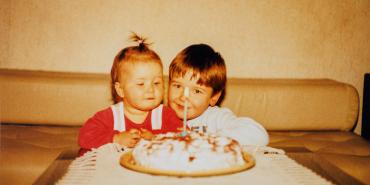Chalkboard Advice

When my wife redecorated our kitchen, she hung a small chalkboard on the wall. The idea was for us to write a Scripture verse on that board and learn it as a family. We look at it in the morning before school or around the table at supper time. The chalkboard works for us. Now my 7-year-old and my 9-year-old can rattle off verses, and they are beginning to hide the Word in their hearts (Psalm 119:11).
One verse has been particularly meaningful for me. I pastor a church. People from my congregation often take me to lunch, or to chat over coffee. The verse I wish we could temporarily tattoo on our foreheads as we look across the table at each other is: "Do not let any unwholesome talk come out of your mouths, but only what is helpful for building others up" (Ephesians 4:29). Neither they nor I usually have a problem with "unwholesome talk"—if that means using bad language. The issue is subtler. Holiness folks would never intentionally stir up anger with a harsh word (Proverbs 15:1), but "speaking the truth in love" (Ephesians 4:15)—now that's part of our job as believers. Right?
I don't know if anyone has ever spoken "the truth in love" to you, but I have experienced that on several occasions. I would compare it to catching a javelin...by its point. Such conversations are never fun. Rather, they are filled with anxiety and pain. I have rarely, if ever, heard reference made to "speaking the truth in love" with the emphasis upon love. Have you?
Can "truth," or what we perceive as the truth in a certain situation, be crafted into a tool that hurts, harms, and hinders our relationships with one another?
Of course it can! Maybe the question should be: Why do we let that happen when we know the power of words? You and I know "sticks and stones can break bones." But we also know, in spite of the little jingle, that words can damage even more deeply.
Much of the issue revolves around kindness. God's Word tells us, "love is patient, love is kind" (1 Corinthians 13:4). Paul says that kindness is a "fruit of the Spirit" (Galatians 5:22). What has happened to kindness not just in the culture, but in the church? Aren't we Spirit-led, Spirit-filled people?
If we are committed to loving God with all of our hearts and loving our neighbors as ourselves—which was one of John Wesley's favorite ways to describe holiness—we must carefully and prayerfully consider our words. We must ask, "Do I speak words of kindness? Would I speak these words if I were aware of Jesus' presence? Are they words that build up others?"
Those are the only real options. We have no viable alternative in between. Sometimes the kindest thing we can do is to bite our tongues and to err on the side of love rather than truth.
It would be a relief if we could take back words as easily as we can wipe clean the surface of a chalkboard. But it's not that easy. So the Bible teaches us the importance of preventative measures. In fact, James 1:26 says: "If anyone considers himself religious and yet does not keep a tight rein on his tongue, he deceives himself and his religion is worthless." I think I've found my next verse for the chalkboard!
Brad Estep is senior pastor of the First Church of the Nazarene in Winter Haven, Florida.
Holiness Today, July/August 2005
Please note: This article was originally published in 2005. All facts, figures, and titles were accurate to the best of our knowledge at that time but may have since changed.




